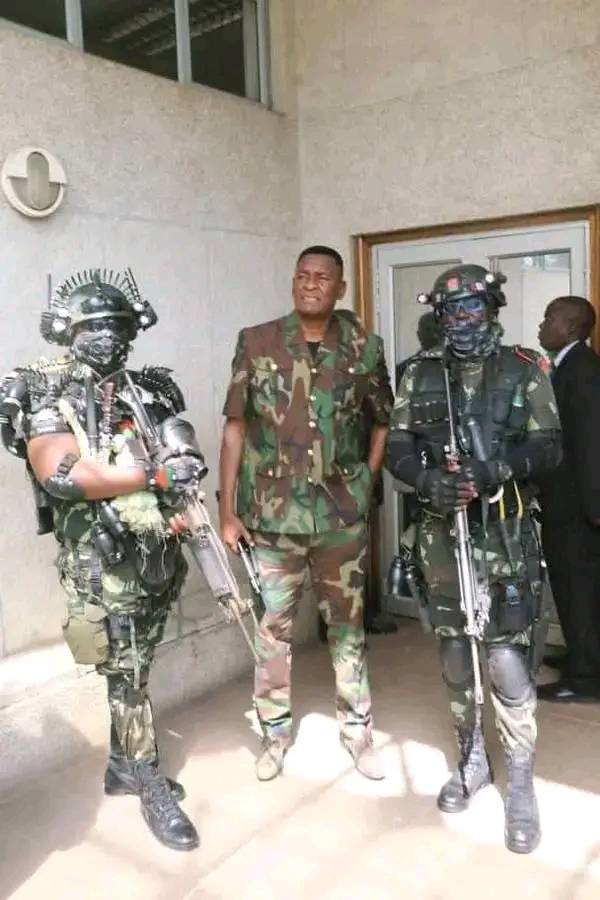Malawi faces a dangerously volatile situation that threatens to throw the electoral process into disarray. It has been revealed that the Democratic Progressive Party (DPP), through its powerful operative Norman “Pythius Hiwa” Chisale, has allegedly mobilised and paid disgruntled retired and ex-soldiers to stage violent protests in the event Arthur Peter Mutharika loses today’s presidential election.
Information made available to The Pangolin Online indicates that Chisale has disbursed as much as K700 million to bankroll the clandestine operation, recruiting former soldiers and deploying them across hotspots in Lilongwe, Mchinji, Ntchisi, Dedza and Dowa.
The mission, according to sources, is to manufacture chaos through staged and fake protests with operatives reportedly set to don stolen Malawi Defence Force (MDF) uniforms to disguise themselves as serving soldiers rejecting the vote outcome.
This strategy is fashioned to echo the 2019 post-election crisis, when Malawians poured into the streets to protest results announced under the leadership of then-MEC chairperson Jane Ansah—now Mutharika’s running mate.
By recreating those scenes, the DPP is said to be seeking to destabilise the country and question the legitimacy of the vote.

Sources further allege that Chisale has been stoking resentment within the ranks of these retired soldiers by invoking the forced exit of former MDF commander, Major General Andrew Lapken Namathanga, claiming he was pushed out because he hailed from the Lhomwe belt.
The DPP is reportedly banking on this grievance narrative to fuel anger and loyalty among its recruited ex-soldiers.
The operation has already triggered alarm among Malawians online, with citizens openly warning those involved to desist.
“So inu a DPP mwapanga deploy ma retired soldiers awawa kuti asokoneze zisankho. Mwauponda mafana,” read one post.
Another warned: “The good thing is komwe mukugona tikukudziwa, mayina anu alipo, tionetsana. My message to you the retired soldiers, if I were you I could enjoy my retirement in peace. Mufera zaeni.”
Reports seen by this newsroom show specific deployments: Lilongwe in Kabudula, Msundwe, Ngwenya (Area 24); Mchinji in Chiosha; various hotspots in Dedza and Ntchisi; and key centres identified as flashpoints in Dowa.
The leaked list of operatives includes names such as WOI Kalambala and CPL Juba (Kabudula), WOI Essavo and SGT Kansungwi (Area 24), WOI Chimtokoma and CPL Kaponda (Dedza), WOI Brazio Majawa (Mchinji), and several others allegedly stationed in Msundwe and Dowa.
The revelations come against the backdrop of wider DPP-linked violent plots already under police investigation, including the reported market-burning plan targeting major markets in Blantyre, Limbe, Lilongwe, Mangochi, Mzuzu and Kasungu if the early polls show that Mutharika is trailing.
The arson strategy was designed to paralyse and disrupt ballot logistics, part of a broader nationwide destabilisation campaign.
There are also reported attempts by DPP-linked groups to mobilise unregistered villagers to storm polling stations in order to provoke violent scenes when turned away.
The Malawi Police Service, working with the MDF and Malawi Prison Service, has since launched a National Electoral Security Joint Taskforce, with command centres established nationwide to detect and respond to threats in real-time.
The UNDP has equipped the taskforce with drones, mobile devices and surveillance gear worth over K350 million to aid monitoring.
Inspector General Merlyne Yolamu has assured Malawians that security agencies are aware of the reported plots and will act decisively to safeguard the credibility of the polls.
Analysts warn that if the allegations prove accurate, the DPP’s strategy represents one of the gravest threats to Malawi’s fragile democracy since multiparty politics was restored. By paying soldiers, stealing military uniforms, and plotting arson, the party risks plunging the nation into uncontrollable chaos.
For many Malawians, the message is clear: the ballot, not violence, must decide the country’s future.








